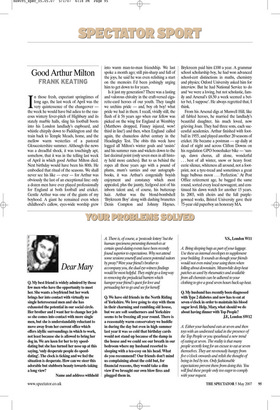Good Arthur Milton
FRANK KEATING
In those fresh, expectant springtimes of long ago, the last week of April was the very quintessence of the changeover the week he would have bid adieu to the raucous wintery fever-pitch of Highbury and its stately marble halls, sling his football boots into his London landlady’s cupboard, and whistle chirpily down to Paddington and the train back to Temple Meads, home, and the mellow warm westerlies of a pastoral Gloucestershire summer. Although the news was a dreadful shock, it was touchingly apt, somehow, that it was in the telling last week of April in which good Arthur Milton died. Next birthday would have been his 80th. He embodied that ritual of the seasons. We shall never see his like — ever — for Arthur was obviously the last of an exceptional line: only a dozen men have ever played professionally for England at both football and cricket. Gentle Arthur was one of the giants of my boyhood. A giant he remained even when childhood’s callow, eyes-wide worship grew into warm man-to-man friendship. We last spoke a month ago; still pin-sharp and full of the joys, he said he was even relishing a start on the memoirs I’d been joshingly urging him to get down to for years.
Is it just my generation? There was a lasting and valorous chivalry in the craft-versed cigarette-card heroes of our youth. They taught we urchins pride — and, boy oh boy! what pride we had in them. I recall, vividly still, the flush of it 56 years ago when our fellow was picked on the wing for England at Wembley (Matthews dropped, Finney injured, wow! third in line!) and then, when England called again, the chanceless debut century in the Headingley Test. The obits this week have logged all Milton’s winter goals and ‘assists’ and his summer runs and wickets down to the last decimal point (only seven men in all history held more catches). But to us behind the ropes all those years ago with a pound of plums, mum’s sarnies and our autographbooks, it was Arthur’s congenially boyish enjoyment and constancy which most appealed, plus the jaunty, feelgood zest of his inborn talent and, of course, his buttercup hair. Arthur was the blond-bombshell ‘Brylcreem Boy’ along with dashing brunettes Denis Compton and Johnny Haynes. Brylcreem paid him £100 a year. A grammar school scholarship boy, he had won advanced school-cert distinctions in maths, chemistry and physics; Oxford University asked him for interview. But he had National Service to do and ‘we were a loving, but not scholastic, family and Arsenal’s £8.50 a week seemed a better bet, I suppose’. He always regretted that, I think.
From his Arsenal digs at Muswell Hill, like all fabled heroes, he married the landlady’s beautiful daughter, his much loved, now grieving Joan. They had three sons, each successful academics. Arthur finished with football in 1955, and played another 20 seasons of cricket. He became a postman — up daily at dead of night and across Clifton Downs on his regulation GPO boneshaker bike — ‘sunup, dawn chorus, all alone, wonderful ... best of all winter, snow or heavy frost: eerie silence, whiteness all around, not a footprint, not a tyre-tread and sometimes a great huge bulbous moon ... Perfection.’ At Post Office retirement age, he bagged the same round, sorted every local newsagent, and continued his dawn watch for another 15 years. In 2003, with choirs and the full purplegowned works, Bristol University gave their 75-year old paperboy an honorary MA.


































































































 Previous page
Previous page